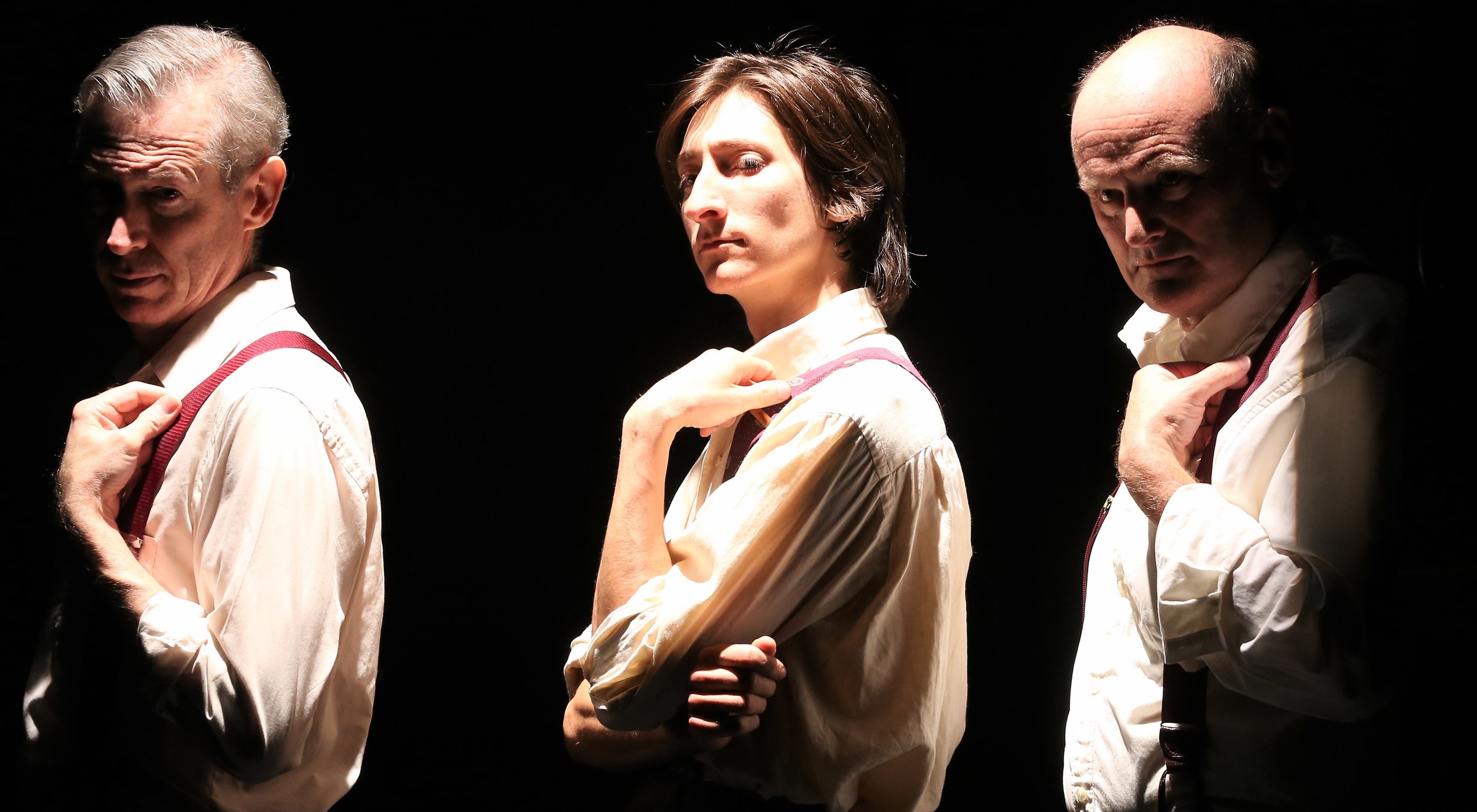The works of Kurt Vonnegut are having a mini-renaissance in New York this year. His 1970 play Happy Birthday, Wanda June has reopened at the Duke after an Off-Off-Broadway run in the spring. Now comes Brian Katz’s stage adaptation of his early novel Mother Night (1962). Vonnegut aficionados may note a few tenuous links to his masterwork, Slaughterhouse-Five (1969), and it’s a pleasant introduction to the writer, so vital to the 1960s but so out of fashion nowadays.
Originating in San Francisco at the Custom Made Theatre Company, Katz’s adaptation, which he has directed, can’t really substitute for the novel or as a credible meal in itself. However, as an aperitif to whet the appetite for the full Vonnegut experience of works like Cat’s Cradle and God Bless You, Mr. Rosewater, it will do. Certainly fans of Vonnegut will find familiar elements.
“You admire pure hearts and heroes. And you believe in romance. You’d be an authentic hero, about a hundred times braver than any ordinary man.”
The central character is Howard J. Campbell Jr. (Gabriel Grilli), a prisoner in an Israeli jail awaiting trial for Nazi war crimes. (Campbell also puts in an appearance in Slaughterhouse-Five.) A playwright who was born in America but raised in Germany after age 11, Howard married Helga, a German actress with Nazi sympathies (Trish Lindstrom), and eventually became a speechwriter and broadcaster of Nazi propaganda. (The adaptation has cameos by Adolf Eichmann and Josef Goebbels.)
Like the novel, the play uses Howard as a narrator and jumps backward and forward in time. If at first Vonnegut seems to be exploring the thoughts and behavior of a dyed-in-the-wool American turned Nazi, a redeeming complication is introduced: Howard was, in fact, a double agent whose broadcasts, punctuated with pauses, hems and haws, and coughs, communicated top-secret information to the listeners. Only FDR and Howard’s handler, Wirtanen (a woman now, in a departure from the novel, played with steely determination and yet kindness by Andrea Gallo), were aware of his spy status. Wirtanen has gleaned the best way to recruit Howard from reading and seeing his plays: “You admire pure hearts and heroes. And you believe in romance. You’d be an authentic hero, about a hundred times braver than any ordinary man.”
Mother Night, like several Vonnegut’s novels, has a picaresque feel, and Katz’s production conveys the various episodes without seeming too disjointed as it jumps from Berlin parties to Greenwich Village to the Israeli prison. But Howard, as a writer/recorder/narrator, isn’t as interesting as the eccentrics who come into his orbit. They include Helga’s family: her sister Resi (also Lindstrom) and their father, a Nazi police chief. Howard also falls in with a gruff old painter name Kraft (Dave Sikula), who turns out to be a Communist agent living in Greenwich Village. There he also encounters an American Aryan supremacist, Jones (Eric Rice), a religious nut whose declarations sound eerily contemporary.
Everything we do is to make the country stronger. Join with us, and let’s get the Jews! The Catholics! The Negros! The Unitarians! The foreign-born, who don’t have any understanding of democracy, who play right into the hands of the socialists, the communists, the anarchists, the anti-Christ and the Jews!
Jones seemingly reunites Howard with his long-lost Helga, who disappeared during the war in a visit to troops in Crimea, and now brings him a suitcase of all his early writings. Howard learns that her father was hanged by slave laborers working on his home in Berlin.
From left: Eric Rice, Matthew Van Oss and Dave Sikula play members of the ensemble in Mother Night, as well as individual characters. Top: Gabriel Grilli as Howard Campbell, with Trish Lindstrom as his wife, Helga. Photographs by Carol Rosegg.
At some points, too, Katz introduces a chorus, and they are a bit more jarring; immediately after the reunion, the chorus appears to poetically describe Howard and Helga’s lovemaking: “…my love-slave girl met me in greedy kind/ until Mother Night herself,/ who had made the most extravagant demands on us,/ could ask no more./ Mother Night herself called an end to the game.”
But although the script is packed with incidents, the production doesn’t really catch fire as a thrilling piece of theater. Then, too, the actors have varying abilities. Gallo and Sikula, along with Dared Wright as Howard’s brutal nemesis, are the most successful. Yet although the eccentric characters are always welcome, Grilli’s Campbell feels bland as an Everyman manipulated by others. His story at times seems just to plod.
All the main characters, who have assumed identities contrary to who they really are, provide Vonnegut his baldly declared theme, and it doesn’t let Howard off the hook, secret hero or not. It’s repeated as almost the final line: “We are what we pretend to be, so we must be careful about what we pretend to be.”
The Custom Made Theatre Company’s production of Mother Night runs through Nov. 3 at 59E59 Theatres (59 East 59th St.). Evening performances are at 7:15 p.m. Tuesday through Saturday; matinees are at 2:15 p.m. Saturday and Sunday. For tickets and information, visit 59e59.org.




